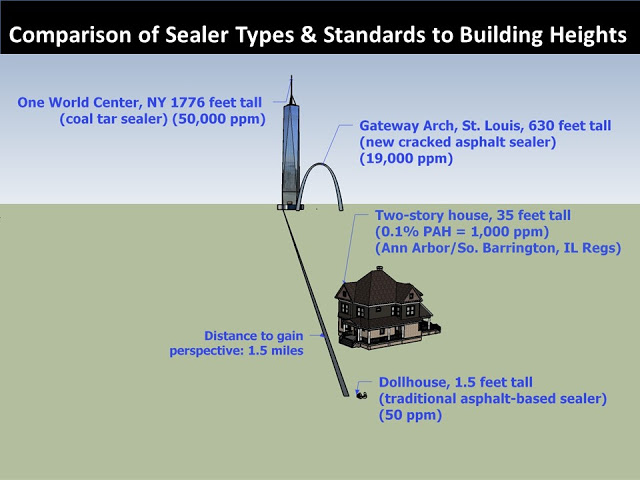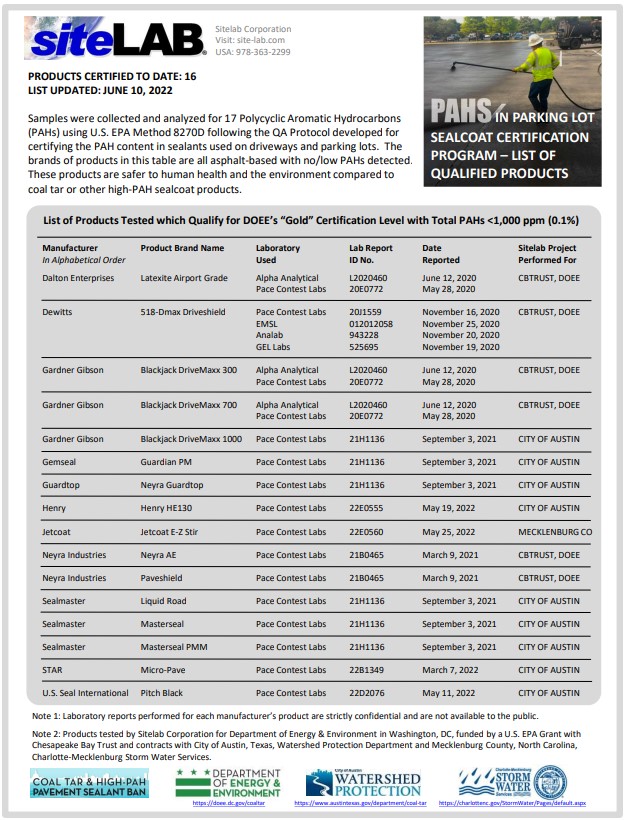First Guide to Asphalt Sealer Test Results
 There hasn’t been a central location for information about the chemical concentrations of asphalt sealcoating products which don’t contain coal tar…until now.
There hasn’t been a central location for information about the chemical concentrations of asphalt sealcoating products which don’t contain coal tar…until now.
We didn’t think we needed to. In general we thought asphalt-based products neatly fit into a category with low concentrations of toxins called polycyclic aromatic hydrocarbons or “PAHs.” Coal tar sealers on the other hand, exceeded those concentrations by a thousand times, so it wasn’t that important to differentiate between the non-coal tar products.
Now We Need a Guide
In 2015 a new line of non-coal tar products was introduced which challenged that thinking. We wrote about it in an article entitled, “New Sealer Alternatives Aren’t All They’re Cracked Up to Be.”
Initial tests and product literature indicated these new products have PAH concentrations more akin to coal tar than asphalt. The comparison figure below illustrates this point. The height of known structures can be compared to the concentrations of products. Before, most asphalt-based products were in the range of a small dollhouse with low concentration of PAH’s and coal tar products loomed tall with large concentrations like the One World Trade Center depicted.

New Regulations
Re-examination of Existing Products
That is why when this first came to light, we asked (December 2015) the industry to step forward and have your products tested.
What the Testing Doesn’t Reveal
What the Testing Does Reveal
Apples to Apples Comparisons
decrease in PAH levels during drying. How this would affect HPO sealers is uncertain but could have a similar effect. All figures have been adjusted to reflect a dry weight basis, but there has been no allowance for the loss of PAH’s during drying and its effects.
Future Testing
| Product Name | Asphalt Sealer PAH Content (PPM) | Asphalt Sealer % PAH |
|---|---|---|
| TuffSeal/Acrypave http://www.acrypave.com/ | Non-detect | 0 |
| Bio-Seal/Aexcel Corp http://www.biostripe.com/products/sealcoat | Non-detect | 0 |
| Eco-Seal http://www.eco-seal.net/ | Non-detect | 0 |
| Carbonplex /EcoStar Science http://www.ecostarscience.com/index.html | Non-detect | 0 |
| GuardTop http://guardtop.com/ | Non-detect | 0 |
| Pitch Black http://www.gopitchblack.com/ | Non-detect | 0 |
| Rynotite /Sealtite of Arklahoma http://sealtitearklahoma.com/ | Non-detect | 0 |
| Mega Black (Asphalt Renovations, St. Joseph, MO) | 12 | 0.001% |
| Crack Stopper/Gardner-Gibson https://www.gardner-gibson.com/ | 12 | 0.001% |
| CMS-1P/QB/Western Colloid http://www.westernemulsions.com/ | 59 | 0.006% |
| SafeSeal Michigan https://www.safesealofmichigan.com/ | 40 | 0.004% |
| Henry Seal 532, Henry Company http://us.henry.com/driveway-sealers/drivewaysealersandrepairproducts/532asphaltresurfacer | 50 | 0.005% |
| GSB 88 Gilsonite/ ASI http://www.asphaltsystemsinc.com/products/gsb-88 | 215 | 0.0021% |
| Paveshield/NEYRA Industries http://www.neyra.com/products/sealers/paveshield | 694 | 0.0694% |
| MasterSeal/Sealmaster http://sealmaster.net/products/pavement-sealers/masterseal-asphalt-blacktop-sealcoating/ | less than 1,000 | less than 0.1% |
| Liquid Road/Sealmaster http://sealmaster.net/products/pavement-sealers/liquid-road-asphalt-blacktop-paving-sealcoat/ | less than 1,000 | less than 0.1% |
| COMMON REGULATORY LIMIT | 1,000 | 0.100% |
| Jennite AE/NEYRA Industries http://www.neyra.com/products/sealers/jennite-ae | 1,168 | 0.117% |
| Black Diamond/GemSeal https://www.gemsealproducts.com/products/black-diamond/ | 19,064 | 1.906% |
| AVERAGE COAL TAR SEALER | 50,000 | 5.00% |

PAH Content of Common Sealers
(Listed in parts per million (ppm/ % PAH)-
Tuffseal/Acrypave Non-detect (0.0%)
-
Biosealcoat/Aexcel Corp Non-detect (0.0%)
-
GuardTop Non-detect (0.0%)
-
Pitch Black Non-detect (0.0%)
-
Rhynotite 4 ppm (0.0%)
-
Mega Black (Asphalt Innovations) 12 ppm (0.0%)
-
Crack Stopper (Gardner Gibson) 12 ppm (0.0%)
-
Safe Seal Michigan 40 ppm (0.0%)
-
Henry Seal 532 (Henry Company) 50 ppm (0.0%)
-
GSB 88 (ASI) 215 ppm (0.0%)
-
Paveshield (Neyra Industries) 694 ppm (0.07%)
-
COMMON REGULATORY LIMIT Less than 1,000 ppm (0.1%)


